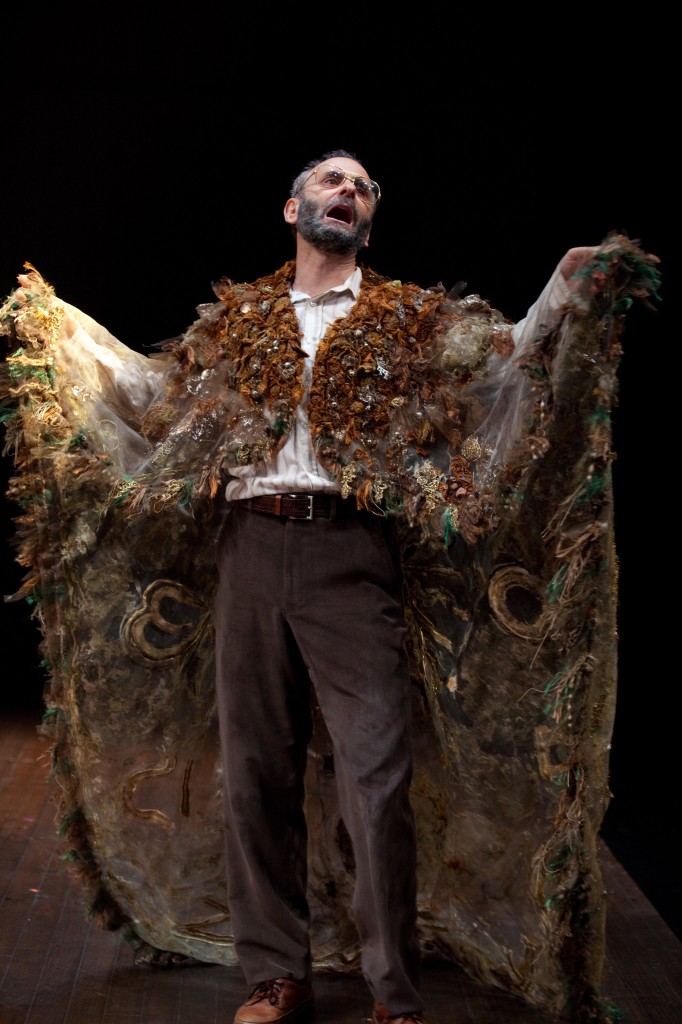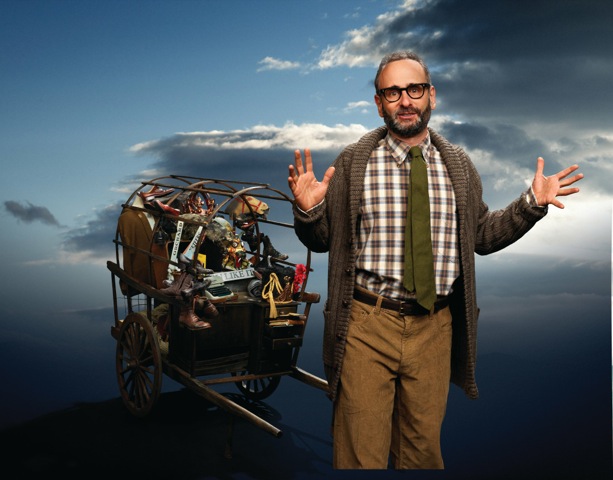
Credit: Cylla von Tiedermann
At the Firehall Arts Centre. No more performances
Posted March 2, 2014
Alon Nashman, co-creator (with Paul Thompson) of Hirsch, kicked off his solo performance by coming down the back stairs, through the audience to the stage, announcing, “I am your actor for the evening”. He then suggested that, from beyond the grave, Hungarian-Canadian director John Hirsch (1930-1989) might call him “a charlatan” and “an opportunist” because Nashman’s relationship with Hirsch had been admittedly thorny. Years ago, as a young actor playing Caliban in a Hirsch-directed production of The Tempest, Nashman was thoroughly chewed out by Hirsch when, not having learned his lines, Nashman tried to explain his long pauses by saying he was “processing” his character. Hirsch didn’t buy it and Nashman found himself on the receiving end of a ferocious tongue-lashing. So, while this show is a tribute to an intense, passionate, driven and hard-driving Hirsch, there’s a bit of not-so-divine retribution as Nashman pokes some fun at the impatient, egotistical ‘drama king’ who was given to storming around the set, hands waving, mercilessly berating actors. He was difficult but he got results.
Hirsch was born in Hungary to a Jewish shopkeeper who surrounded himself and his family with theatre people including Nijinsky. War came and Hirsch’s entire family perished in the Holocaust; he alone survived and was left to wander orphaned and penniless across Europe at the age of thirteen.
The story moves rapidly and sketchily but eventually Hirsch emigrates to Winnipeg, chosen by him because its geographically central position looked “safe”. At seventeen he met Tom Hendry with whom he would eventually found the Manitoba Theatre Centre.
There’s a lot of name-dropping in this Chutzaph! Festival/Firehall Arts Centre/ Touchstone Theatre presentation and for those who aren’t familiar with the Canadian theatre scene through the late 50s, 60s 70s and 80s, it’s frustrating: “Martha” is Martha Henry; Paul Gascon is the founding director of the National Theatre School of Canada; “Brian” was his lover. (Hirsch, according to a November 30, 2011 National Post article, was self-described as “a member of four mafias: Hungarian, Jewish, homosexual and Winnipeg.”)
Hirsch also demands a high level of theatre literacy as Nashman jumps in and out of characters drawn from various plays. Obvious is Mother Courage, pulling the wagon with the sound of distant explosions. (Hirsch’s production in Winnipeg was the first performance of Bertolt Brecht’s play outside Europe.) Not so obvious, unless you know your Chekhov, is Leonid Gayev from Three Sisters; and familiarity with S. Ansky’s The Dybbuk is useful.
Nashman’s performance as Hirsch’s maternal grandmother flapping her black lace shawl like “a cave of vampires”, as Hirsch described her, is a welcome intimate peek into Hirsch’s boyhood.
Nashman is engaging, entertaining and I left the theatre wanting to know more about Hirsch – always a good sign. The book to read is A Fiery Soul: The Life and Theatrical Times of John Hirsch by Fraidie Martz and Andrew Wilson.
This wasn’t a show that wowed me but here’s a rave from an indisputable source – Dame Maggie Smith who played Masha in Hirsch’s great 1976 Stratford production of Three Sisters. In the fall of 2012, Smith returned to Stratford for the first time in more than three decades and saw just one play: Hirsch. She subsequently sent Nashman the following quote for him to use as he saw fit: “I had the joy of working with John Hirsch, and then the joy of seeing Alon Nashman’s amazing performance, which made me feel I was back with John. DON’T MISS IT!” The capital letters and exclamation point are Smith’s.
Now there’s a quote Alon Nashman can take to the bank.

Credit: Cylla von Tiedermann

